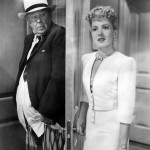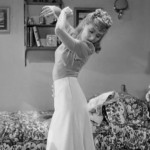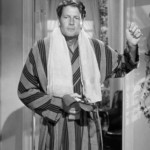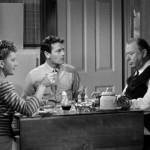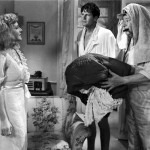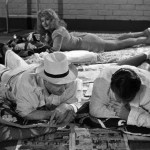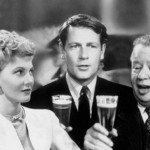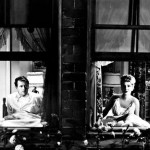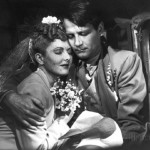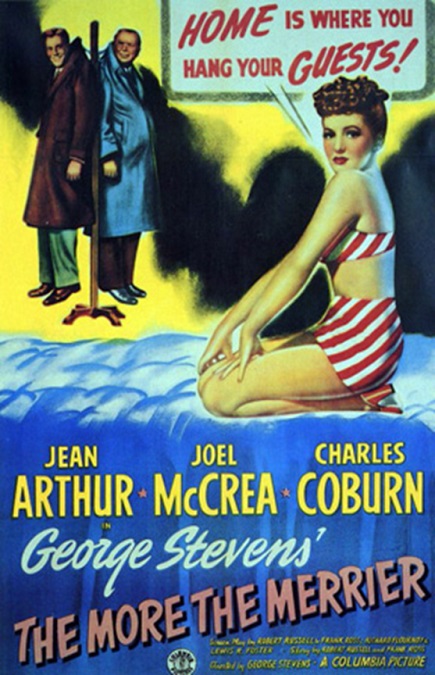
The More the Merrier – 1943
I have to be honest. This was a fairly weak example of a screwball comedy. It had its amusing moments, but they seemed to be few and far between. True, the movie had its virtues, but its failings seemed to outnumber them. I’ll be upfront about it. This shouldn’t have been nominated for Best Picture.
It is a fine movie if you just want to turn your brain off. It was fluff and nothing more. It had silly characters doing silly things that were mildly amusing, but the comedy simply wasn’t that funny. Then, at times, they served up a competent romance story, but the confusing ending tossed all that out the window. They had a couple of OK actors, but the lead female, Jean Arthur, just wasn’t a very good actress. Sure, she looked pretty, but there were times when she seemed to be struggling with her lines.
The story was a simple one. Due to a housing shortage in Washington D. C. on account of WWII, Constance (Connie) Milligan, played by Arthur, decides to rent out half of her apartment in an effort to “do her part” for the war effort. See that? See how they couldn’t help throwing us that patriotic, pro-war angle?
The movie’s most talented actor, Charles Coburn, played Benjamin Dingle, an amoral and amusingly dishonest old fuddy-duddy. He lies and forces his way into the apartment, showing that the character makes his way through life by being cleverer then the average joe-on-the-street. Coburn had some of the funniest lines in the film, which isn’t saying much. At least he was charming in a mischievous sort of way. He played his part well. Without him, the film would have really fallen on its face.
After manipulating and intimidating the weak-willed Connie into letting him have the rental, he meets Joel McRae, playing the part of Joe Carter, an army officer in D. C. waiting to go off on assignment in Africa. Dingle sublets half of his half of the apartment to Joe without telling Connie, the apartment’s owner. And with the three of them there, together, hijinks ensues.
McCrae seemed like he didn’t really want to be in the movie. There were times when he seemed like he wasn’t paying attention to what he was doing. I was expecting more from him. I wanted to see him react more to the action taking place around him. But he just looked bored and uninvolved. Maybe he was trying to imitate Gary Cooper’s strong, silent guy persona. I don’t know. But he just looked sleepy.
Also, I can’t help but look at the film with my modern eyes. Would a woman in the 1940s really run to her room and sob into her pillow because she caught a man reading her diary? Would a woman breaking an engagement really be cause enough for her to move away to another state because of the scandal? Maybe a rich socialite woman, but not a woman as common and unimportant as the character of Connie.
And while I am bagging the film, I have to mention a couple of logistical issues I noticed. First, when McCrae is in the shower, he neglects to close the shower curtain because we needed to see the action going on outside the bathroom door. But not only would he have gotten water all over the bathroom, especially the way he was splashing water all over himself, but the people outside the bathroom would have gotten to see the Full Monty. It just felt like the director, George Stevens, was being lazy rather than finding a different way to show what needed to be shown.
Second, near the end, when Dingle has an entire wall ripped out of the apartment so that the questionably happy couple would have not two bedrooms, but one, I had to protest! Construction of that nature takes more than mere ours, and it creates a huge mess. Not only that, but Dingle didn’t own the building, and any contractor who did the work would get sued in a heartbeat. Sure it’s a silly comedy, but can we at least give a nod to reality in a Best Picture nominee?
Still, the film did have one relatively strong point. As I have already mentioned, the romance scenes were well done. Here is where McCrae looked like he was in the moment. He was animated enough to make him seem credible as a romantic lead. And really, he was a very attractive man. Even Arthur did alright when her dialogue didn’t have to be delivered too quickly. The scenes were cleverly written with a surprising amount of subtlety.
But the ending baffled me. Connie and Sergeant Carter get married, though neither of them were happy about it. But there was no reason they shouldn’t have been. It was already established that they loved each other, but Connie couldn’t stop crying, and Joe was doing nothing to comfort her. It made no sense. Oh well.
